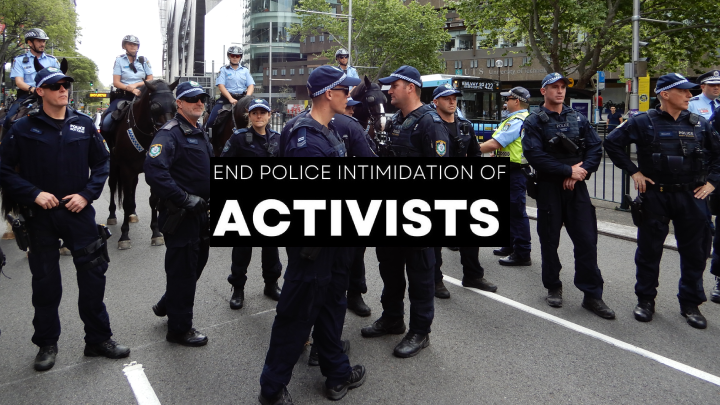
When three NSW police officers turned up unannounced at rights activist Seth Dias’ home on 26 October to drill him about whether he’d be attending a protest this week, they made “explicitly clear” that they’d switched on their body cams before asking a list of questions.
The officers asked if he’d be attending demonstrations regarding the International Mining and Resources Conference in Sydney this Wednesday through to Friday. Dias said he had no idea about any such rallies, and they underscored their concern was regarding Blockade Australia actions.
“I was then asked if I was intending to organise or attend any protest on the 2 to 4, or if I was aware of any circulation on any social media platform about a demonstration on these dates,” wrote ASEN (Australian Student Environment Network) state convenor, “to which I said I had not seen anything.”
This intimidatory tactic is nothing new for state law enforcement officials. They’ve been paying activists pre-rally visits for years now. However, over recent months, it’s been on the increase, and over the past week, the reports of these impromptu calls nationwide have gone through the roof.
The real clincher in the Dias incident is not only were officers trying to scare him off, but they also stressed that new anti-protest laws mean that if he was to show up to the protest, he knew nothing about, and obstruct a road, he’d be liable to up to 2 years in prison and/or a fine of $22,000.
A rights violating practice
The Perrottet government passed amendments to the Roads Act 1993 (NSW) in early April.
So, today, without obstructing roads, bridges, tunnels and places designated as major facilities without police preapproval the aforementioned draconian penalties now apply. And these laws were passed to specifically stamp out climate protests at a time of escalating extreme weather events.
These laws have not only had a chilling effect on climate protests in general, but they’ve also bolstered NSW police in its use of excessive force at protests and intimidatory tactics, such as home visits, as well as stakeouts and at times, raids on climate defender gatherings.
Melbourne Activist Legal Support stated last week that it’s aware of police visits regarding IMARC taking place in Victoria, NSW, the ACT and Queensland. It maintained that the intimidating home visits are “an unacceptable form of political policing that undermines civil and human rights”.
In its 27 October post, MALS advised that the subject of such a police visit is under no obligation to answer questions, “have a chat” or return police calls. It added that they can ask officers what they want, as well as what their names, badge numbers and stations are and if they have a warrant.
And MALS further pointed out that if police do turn up on an individual’s doorstep threatening prison time if they were to show up to a protest, the activist can openly film the whole encounter.
An activist hit list
A vocal opponent of the Perrottet government’s new anti-protest laws, NSW Greens MLC Abigail Boyd said in a statement on Sunday that her party has been made aware of a large number of incidents involving police visiting activists, and it’s demanding the police minister make it stop.
Boyd, who has passed a number of motions trying to get the new protest laws wound back, said these visits are leaving activists feeling “intimidated and shaken”, and its conduct one “would expect in a dictatorship, not a democracy”.
The Greens MLC further stated that the actions of NSW police last week infer that it has a “McCarthyist register of the progressive and politically engaged”, whom they’ve been visiting. And she’s concerned that facial recognition technology may be employed in surveilling activists.
“This is a wildly inappropriate use of police time and resources, acting as a protection racket for billionaire corporations and shareholders at the expense of the rights and liberty of concerned citizens of this state,” Boyd concluded her press release.
“Imagine if the NSW Coalition government spent this sort of energy and resources on acting to address the climate emergency in a meaningful way – I have no doubt that would reduce the number of protests that this government finds so inconvenient.”
